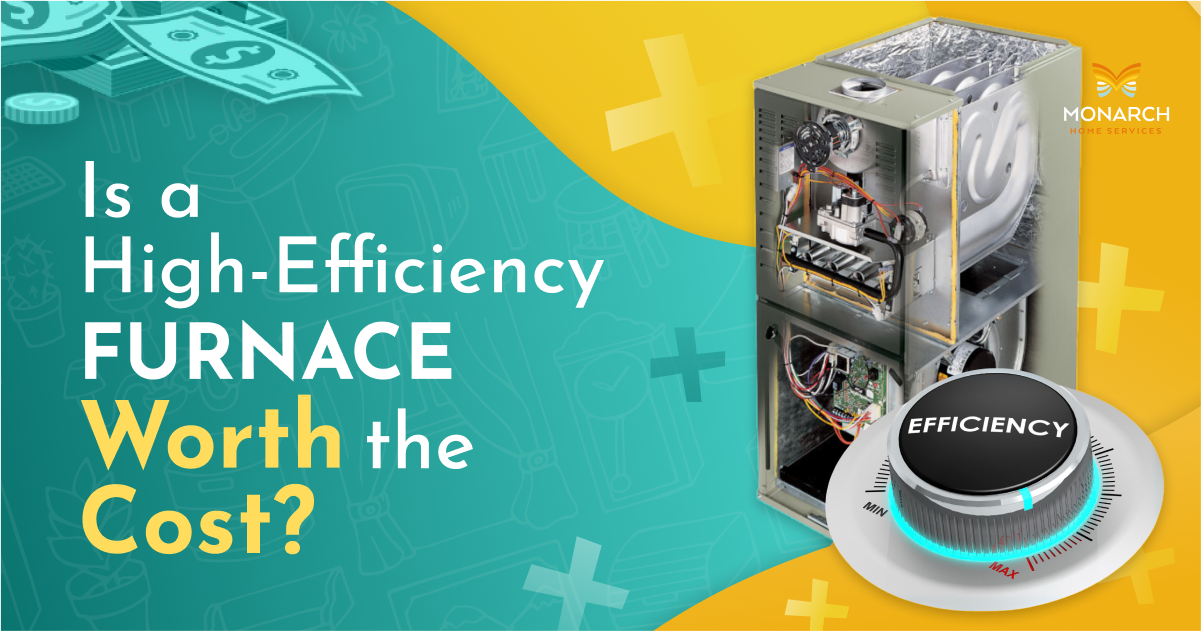According to Angi, the average cost of a new furnace is $4,800 (in 2024 dollars), but a high-efficiency furnace can cost much more. However, a higher initial investment in a heating system may pay off in the long run. We’ll look at how it’s worth adding thousands of dollars to your heater replacement cost.
Efficiency is one of the leading factors in determining how expensive a furnace is. It is measured using a heating unit’s annual fuel utilization efficiency (AFUE) rating. This is a percentage of how much fuel is converted into heat. A high-efficiency model has an AFUE of 96% or higher. Meanwhile, a standard efficiency unit has an AFUE of 80% to 90%.
Is It Worth Spending More?
If your furnace is not heating your home, needs major repairs, or is over 15 years old, investing more in a new one can have many benefits, including the following:
- Long-Term Investment: While high-efficiency furnaces are more expensive upfront, you save on energy costs over time. These systems use less energy from the start and retain their efficiency level for perhaps 20 years or more.
- Speed: Single-stage furnaces are the least costly, but are less efficient. They only turn on or off. Two-speed furnaces have high and low-speed settings to adjust the amount of heating they provide, while variable-speed models are even more adaptive and energy-saving.
- Your Local Climate: The colder the region where you live and the longer it stays cold during the year, the more frequently you’ll use your furnace. Therefore, the more you can save in energy costs compared to a natural gas unit.
- The Size of Your Home: Furnaces in larger homes use more fuel and electricity to provide heating. A high-efficiency unit uses less energy to heat the same amount of space, so a higher heater replacement cost is worth it.
- Tax Credits: You can qualify for a federal energy efficiency tax credit. For a residential high-efficiency furnace, you can receive a 30% credit for the tax year you purchase the unit. In some cases, the amount of the credit you receive can carry over to next year’s tax return (See more details on tax credits from the IRS).
- Comfort: High-efficiency, variable-speed furnaces work at various power levels depending on what you set the thermostat to. They can provide the exact amount of heat you need. However, single-speed furnaces only run at maximum power, which can overheat your home and cost you more in energy than necessary.
- Zoning: Only two-speed or variable-speed furnaces can support HVAC zoning. The upfront cost is worth it, considering you can heat different parts of your home separately. If you have a large or multi-story home, areas that need the most heat can be accommodated, while areas that need little or no heat can be left alone. This reduces the amount of energy used and your utility bills.
- Modern Technology: Aside from zoning, high-efficiency furnaces are compatible with smart thermostats. These allow you to control a variable-speed unit’s settings. You can program your thermostat for more precise temperature control and some models learn your schedule and adjust heating automatically.
- Environmental Benefits: If you are environmentally conscious, paying a higher heater replacement cost can lead to your home producing fewer greenhouse gas emissions. Therefore, you can help contribute to cleaner air.
Conclusion: Should I Invest in a High-Efficiency Furnace?
If these benefits matter to you, investing in a high-efficiency heating system is worth it. The amount of time you plan to spend in your home is another consideration. An efficient model is worth the cost if you’re going to live there for a while. The monthly savings are sometimes immediate; over time, they may pay back at least some of the cost of the furnace. If you don’t plan on living in your home for long, it may not be worth spending extra.
Contact Monarch Home Services
Throughout the San Joaquin Valley, we provide heater replacement and installation services tailored to the heating needs of each customer’s home. Numerous options are available, including high-efficiency furnaces that are up to 98% AFUE. We also install heat pumps, ductless mini-splits, and geothermal heating systems. To learn more or receive a heater replacement cost quote, call us at (661) 215-6657 today!


